Raisi In NY Urges Reporters Not To Ask About Hijab Victim
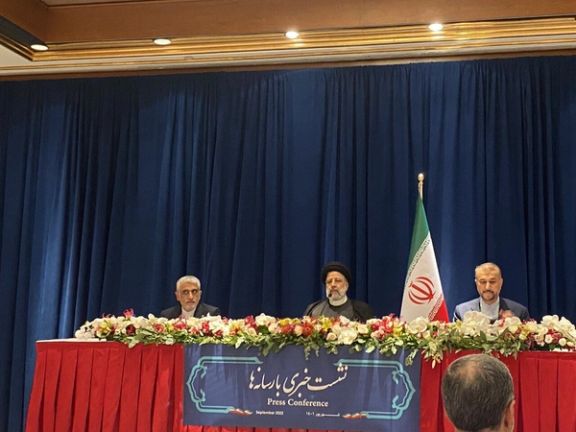
President Ebrahim Raisi held a press a conference in New York on Thursday, warning protesters on streets across Iran that "acts of chaos" are not acceptable.

President Ebrahim Raisi held a press a conference in New York on Thursday, warning protesters on streets across Iran that "acts of chaos" are not acceptable.
Speaking at a news conference on the sidelines of the United Nations General Assembly, claimed that he had ordered an investigation into the case of Mahsa Amini, 22, who died last week due to severe head trauma after being arrested for wearing “improper hijab."
However, authorities have not arrested any police official or provided any details about the progress investigation.
"There is freedom of expression in Iran ... but acts of chaos, riots and vandalism are unacceptable,” Raisi said referring to protesters who have taken to the streets across the country to vent their fury over Mahsa’s death, the biggest protests in the Islamic Republic since 2019.
According to information obtained by Iran International, Raisi's team told US media managers that they are free to ask anything about the status of the talks to revive the nuclear deal but no question on Iran protests. Media have responded that "it's not possible."
Correspondents from major meida outles, including the New York Times, the Washington Post, and the Reuters were removed from the list of invitees for Raisi's press conference.
Protesters in Tehran and other cities torched police stations and vehicles as public outrage over the death showed no signs of abating, with reports of casualties among protesters security forces coming under attack.
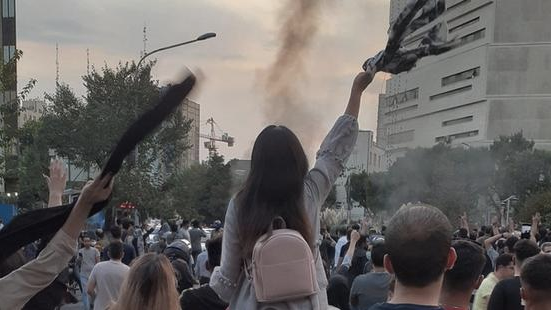
After five days of mysterious silence over the protests in Iran, the Revolutionary Guard (IRGC) reacted on Thursday by accusing and threatening the protesters.
At the same time, one hardliner clerics at the Majles said two days of rallies for the death of hijab victim Mahsa Amini is enough, and another hardliner cleric called Mahsa's murder a "trivial matter".
In an initial statement on Thursday, September 22, the IRGC expressed "appreciation for the police force's efforts during recent days." This was a coy expression of support for murdering Mahsa Amini and attacking, killing and wounding those who took part in the protests that followed. It was also an indication of the IRGC's open support for the violent crackdown of the rallies in over 80 Iranian cities across the 31 Iranian provinces.
A more extensive defiant statement issued on the same date praised the police force as the protector of Iranian's lives, assets and families. This comes while numerous footages posted on social media show the police force beating women and young adults among protesters and shooting at them often at point blank.
The only difference in the police's behavior in comparison to previous rounds of protests since 2009 is that for the first time, young Iranian men and women have started to fight back. Videos show them pushing back heavily armed policemen and their plainclothes agents. Particularly in cities such as Rasht, Qazvin and Hamadan, the police force is seen fleeing from empty-handed young men and women who fearlessly stand against them and the Basij militia.
The IRGC levelled the run-off-the mill accusation of "sedition" against the protesters and repeated hardliner Iranian officials and clerics who claim the protests are "undermining the government's strategic achievements such as joining the Shanghai Cooperation Organization and President Ebrahim Raisi's inspiring visit to New York." Raisi took part in the United Nations General Assembly and delivered a speech in which he claimed his government was an advocate of justice, while exactly at the same time, government forces were beating and arresting protesters.
The IRGC statement further added insult to injury and likened Iranian protesters to the Islamic State warriors. This comes while it was the Iranian police and Basij militia who copied ISIS tactics by sending troops onboard ambulances to suppress the protests. Meanwhile, the hijab police's behavior against women is exactly copied from the behavior ISIS was showing in confrontation with women in Syria and Iraq.
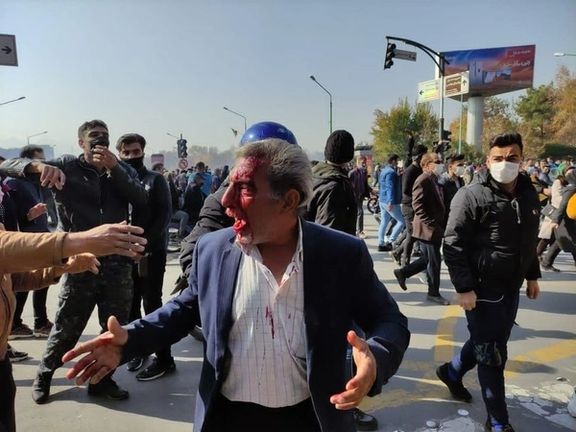
The statement characterized the protests to the murder of Mahsa Amini as "an organized conspiracy hatched by the enemies of the Islamic Republic against the country's security." Meanwhile, in several posts on its Telegram channel, the IRGC claimed that protesters have killed several policemen and Basij militia members in various cities. Based on IRGC's behavior in nationwide protests since 2017, this could be part of the preparation for wider and more violent crackdown on the protests.
In another Telegram post, IRGC's Telegram channel revealed that a pro-government rally has been planned in Tehran for Friday, after prayers, "to denounce the abnormal moves and insults to the holy Koran, setting fire to mosques and disrespectful behavior toward women by a limited number of mercenaries." This is the same jargon the regime has been using against protesters since 2009.
However, what is interesting in this statement, is that the pro-government demonstrators are going to rally from Tehran University, the venue of the Friday Prayers, to the Enghelab Square, less than half a mile away. This could indicate that the organizers of the pro-government rally are aware of the small number of their supporters who cannot fill a larger space.
At the same time, a lawmaker from Esfahan, Hossein Mirzaei said that the murdering of Mahsa Amini is "a trivial matter" and the nation should be instead preoccupied with more important matters such as Arbaeen mourning and Shanghai pact, while another lawmaker, Ahad Azadikhah, said "two days of mourning for Mahsa was enough and those who took to the streets after that are the leaders of belligerent groups."
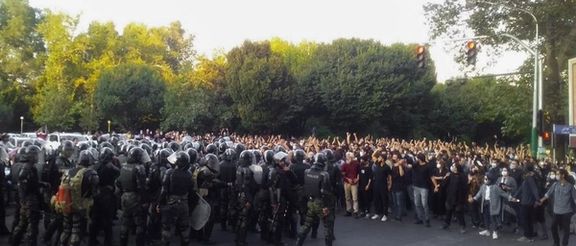
Protests in Iran continued Thursday evening in the capital Tehran and several other cities including in Western cities of Sanandaj and Kermanshah.
Although protests began last Friday when a 22-year old woman, Mahsa Amini died after being detained by the notorious religious police for hijab, nationwide unrest began on Monday, that takes place mostly in the evenings.
Protesters have shown determination and self confidence in many locations by not retreating in the face of police and anti-riot forces.
Disruption in mobile internet which began Wednesday has continued and may prevent or delay news and footage of protests tonight from reaching the Iranian people and the outside world.
According to Iran Human Rights Organization (IHRO), 31 protesters have been shot dead by security forces in various cities and many have been arrested in the past five days. The official news agency (IRNA) has reported a total of 17 deaths among protesters and security forces.
Cloudflare traffic data shows an outage beginning at 1230 UTC. According to Cloudflare Radar which documents Internet trends as seen by the Cloudflare global network MCI, Iran's largest mobile network operator, is experiencing another Internet disruption.
Our live coverage ended at 1:30 Friday Iran time.
--------------------------------------------------------------------------------------------------------------------------
--------------------------------------------------------------------------------------------------------------------------
A report from Amol in northern Iran says fierce protests were underway in the evening, with security forces firing at the crowds. According to unconfirmed reports two people have been killed.
-----------------------------------------------------------------------------------------------------------------------------
Qeshm island in the Persian Gulf. Protesters pelting Khamenei's and Qassem Soleimani’s images on a judiciary building.
----------------------------------------------------------------------------------------------------------------------------
Protesters chanting “Death to Khamenei” in Narmak in eastern Tehran.
--------------------------------------------------------------------------------------------------------------------------
Protest in Khorramabad, capital of Lorestan Province in western Iran. The word "justice" can be heard being chanted.
Fifth straight day of protests in the western city of Hamedan. Protesters are chanting that clerics "should get lost."
-------------------------------------------------------------------------------------------------------------------------
In Rasht, one the largest cities in northern Iran, protesters set fire to police vehicles Thursday evening.
-----------------------------------------------------------------------------------------------------------------------------
Protesters in Jannat Abbad, a suburb west of Tehran set fire to police vehicles Thursday evening.
--------------------------------------------------------------------------------------------------------------------------
Amid Iran’s nationwide popular protests and heavy-handed crackdown by authorities, the US has issued fresh sanctions against the Islamic Republic, targeting hijab police and some security officials.
In a statement on its website on Thursday, the US the Treasury Department said its “Office of Foreign Assets Control (OFAC) is designating Iran’s Morality Police for abuse and violence against Iranian women and the violation of the rights of peaceful Iranian protestors.”
“The Morality Police are responsible for the recent death of 22-year-old Mahsa Amini, who was arrested and detained for allegedly wearing a hijab improperly,” it added.
--------------------------------------------------------------------------------------------------------------------------
Gunshots are heard amid protests in Kashmar, city of 100,000 in eastern Khorasan-e Razavi province.
People have taken to the street since late afternoon in Mobarakeh, town of around 62,000 in Esfahan Province, for the first time.
----------------------------------------------------------------------------------------------------------------------------
--------------------------------------------------------------------------------------------------------------------------
A large protest started Thursday afternoon in Kermanshah, where demonstrators were able to block the path of security forces trying to enter the area to disperse the crowd.
----------------------------------------------------------------------------------------------------------------------------
Protesters cheered a man ripping a large banner of Iran's ruler Ali Khamenei in Amol, city of around 300,000 in northern Mazandaran Province on Thursday.
--------------------------------------------------------------------------------------------------------------------------
In Oshnavieh, a Kurdish majority town of around 40,000 in West Azarbaijan Province, shops were closed Thursday in protest to crackdown on demonstrators in the neighboring Kordestan Province where nearly a dozen have been killed so far.
-------------------------------------------------------------------------------------------------------------------------
Iran blocked Google Play and Apple AppStore Thursday afternoon to prevent downloading of anti-filtering software. The government has mostly disrupted internet access and on Wednesday blocked Instagram, the only major social media app that was still accessible in the country.
-----------------------------------------------------------------------------------------------------------------------------
Human rights group Amnesty International urged world leaders at the UN General Assembly to devise a mechanism to hold Iran accountable for its violent crackdown on popular protests. In a statement on Wednesday, the group said that the international community “must support calls for the establishment of an independent international investigative and accountability mechanism to address the prevailing crisis of impunity in Iran."
---------------------------------------------------------------------------------------------------------------------------
Thursday afternoon, local time - Protesters chanting against Supreme Leaader Ali Khamenei in the center of Tehran, Hejab Street and Keshavarz Boulevard.
-----------------------------------------------------------------------------------------------------------------------------
Eslam Abad-e Gharb, town of around 21,000 in Kermanshah Province. Protesters destroy a police kiosk.
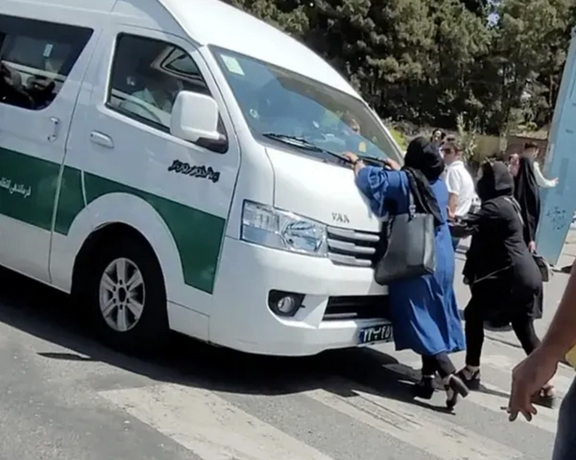
Amid Iran’s nationwide popular protests and heavy-handed crackdown by authorities, the US has issued fresh sanctions against the Islamic Republic, targeting hijab police and some security officials.
In a statement on its website on Thursday, the US the Treasury Department said its Office of Foreign Assets Control (OFAC) is designating Iran’s Morality Police for abuse and violence against Iranian women and the violation of the rights of peaceful Iranian protestors.”
“The Morality Police are responsible for the recent death of 22-year-old Mahsa Amini, who was arrested and detained for allegedly wearing a hijab improperly,” it added.
OFAC also targeted seven senior officials of Iran’s Morality Police, the Intelligence Ministry, the Army’s Ground Forces, Basij Paramilitary Forces, and Law Enforcement Forces, who “oversee organizations that routinely employ violence to suppress peaceful protesters and members of Iranian civil society, political dissidents, women’s rights activists, and members of the Iranian Baha’i community.”
Secretary of the Treasury Janet L. Yellen said, “Mahsa Amini was a courageous woman whose death in Morality Police custody was yet another act of brutality by the Iranian regime’s security forces against its own people,” adding that “We condemn this unconscionable act in the strongest terms and call on the Iranian government to end its violence against women and its ongoing violent crackdown on free expression and assembly.”
Head of the so-called morality police, Mohammad Rostami Cheshmeh-Gachi, and the commander of the Tehran division of forces, Ahmad Mirzaei, as well as Intelligence Minister Esmail Khatib are among the sanctioned officials.

CNN’s Christiane Amanpour said Thursday Iran’s President Ebrahim Raisi declined to show up at a preplanned interview with her in New York after she refused to wear a headscarf upon Raisi’s request.
In a series of tweets, Amanpour said, “This was going to be President Raisi’s first ever interview on US soil, during his visit to New York for the United Nations General Assembly. After weeks of planning and eight hours of setting up translation equipment, lights and cameras, we were ready. But no sign of President Raisi.”
She added that 40 minutes after the interview was due to start, one of Raisi’s aides came over and asked her to wear a headscarf, “because it’s the holy months of Muharram and Safar,” to which she declined, pointing out that “no previous Iranian president has required this when I have interviewed them outside Iran.”
“The aide made it clear that the interview would not happen if I did not wear a headscarf. He said it was “a matter of respect,” and referred to “the situation in Iran” -- alluding to the protests sweeping the country, Amanpour elaborated. "Protests are sweeping Iran and women are burning their hijabs after the death last week of Mahsa Amini, following her arrest by the "morality police,” she said.
“I couldn’t agree to this unprecedented and unexpected condition,” she emphasized, saying that “The interview didn’t happen. As protests continue in Iran and people are being killed, it would have been an important moment to speak with President Raisi.”

Human rights group Amnesty International urged world leaders at the UN General Assembly to devise a mechanism to hold Iran accountable for its violent crackdown on popular protests.
In a statement on Wednesday, the group said that the international community “must support calls for the establishment of an independent international investigative and accountability mechanism to address the prevailing crisis of impunity in Iran."
Stressing the urgent need for action, Amnesty denounced the recent the death in custody of 22-year-old Mahsa (Zhina) Amini and the barrage of gunfire unleashed on protesters which has left about 20 people dead and hundreds injured.
Highlighting the evidence of “security forces’ unlawful use of birdshot and other metal pellets, teargas, water cannon, and beatings with batons to disperse protesters,” Amnesty’s deputy Diana Eltahawy said that “The global outpouring of rage and empathy over Mahsa Amini’s death must be followed by concrete steps by the international community to tackle the crisis of systemic impunity that has allowed widespread torture, extrajudicial executions and other unlawful killings by Iranian authorities to continue unabated both behind prison walls and during protests.”
“The Iranian authorities’ latest brutal crackdown on protests coincides with Ebrahim Raisi’s speech at the UN,” she added, noting that "Iran’s security forces will continue to feel emboldened to kill or injure protesters and prisoners, including women arrested for defying abusive compulsory veiling laws, if they are not held accountable."